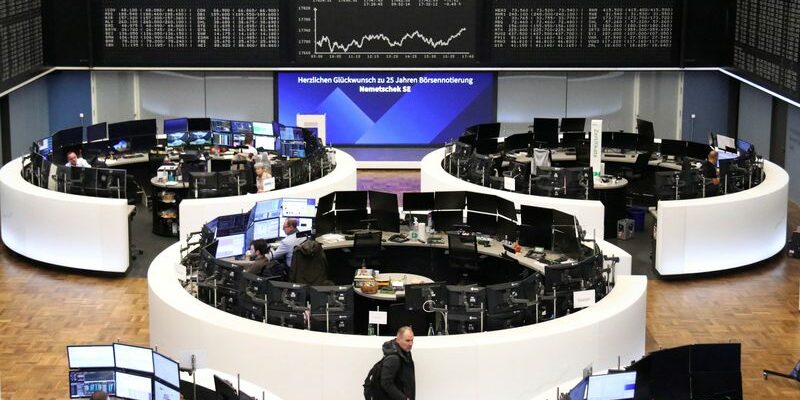by Diana Mandia
(Reuters) – European stock markets ended lower on Monday following profit-taking, with caution advised ahead of the release of consumer prices in the United States, which should provide more details on easing pressures inflationary pressures before possible monetary easing by the Federal Reserve (Fed).
In Paris, the CAC 40 ended down 0.1% at 8,019.73 points and the German Dax fell 0.38%. The only exception among the main indices was the British Footsie, which rose 0.12%.
The EuroStoxx 50 index dropped 0.62%, the FTSEurofirst 300 0.36% and the Stoxx 600, which reached a historic record last Friday, 0.36%.
The markets opted for profit-taking on Monday after recent records on the indices and before the publication, on Tuesday, of US inflation data for the month of February, with central bankers having repeatedly stressed that future indicators would be carefully examined before considering an initial reduction in borrowing costs.
This data will also be essential to confirm that inflation remains stable or to show that the January figures, which showed an acceleration in inflationary pressures and an unexpected rise in producer prices, were only a seasonal anomaly.
Inflation is expected to increase by 0.4% year-on-year and 3.1% on an annual basis in February.
Caution is also called for in the face of recent records on the indices, driven last week by optimism about artificial intelligence and the prospects of a rate cut on both sides of the Atlantic.
According to Amélie Derambure, portfolio manager at Amundi, the decline in stocks is also explained by uncertainty over the economic outlook and high valuations.
“We think there are excesses in the markets and so we want to be a little more cautious,” she said.
In Europe, investors will also be looking this week at figures for British inflation and euro zone industrial production for more clues about plans by the European Central Bank (ECB), which officials are considering, according to sources, rate reductions in June and July.
In the United Kingdom, the Bank of England (BoE) should start easing its monetary policy in August and no longer in May, according to updated forecasts from UBS Global Research published on Monday.
VALUES
The technology sector for its part ended down 2.09%, the biggest drop in the Stoxx 600, in the wake of the Nasdaq and the continuation of profit-taking on Nvidia in the United States.
The sector was also weighed down by the 8.9% drop in the shares of BE Semiconductor Industries, impacted since Friday by concerns about potential delays in the adoption of hybrid bonding technology.
Telecom Italia (TIM), whose shares were hit last week by the lack of details on its financial accounts, lost 4.5% on Monday, the publication of details on cash flows and debt levels of the company not having convinced investors.
A WALL STREET
At closing time in Europe, the Dow Jones lost 0.11%, the Standard & Poor’s 500 0.19% and the Nasdaq Composite 0.20%,
Boeing drops XXX% after at least 50 people were injured Monday in Australia during a LATAM Airlines flight from Sydney to Auckland after a “technical problem” on a Boeing 787-9.
Meta dropped 3.9%, leading losses among tech sector stocks, while Nvidia fell 1.22%, continuing Friday’s decline after hitting records last week.
CHANGES
The dollar showed a slight increase (+0.13%) against a basket of reference currencies, while the euro lost 0.11% to 1.0925 dollars.
In cryptocurrencies, bitcoin rose 6.12% to a new high of $72,603.08, thanks to the craze for spot ETFs backed by cryptocurrency.
RATE
Euro zone bond yields rose slightly on Monday after suffering their biggest weekly fall since December last week, as mixed US labor market data and central bank comments left the door open for a decline in bond yields. ECB and Federal Reserve (Fed) rates in June.
The German ten-year yield gained 3 basis points to 2.299%, and that of the two-year rate rose 2.9 bps to 2.7672%.
The American bond markets are also up slightly before inflation, with the yield on the ten-year rate nibbling a basis point to 4.0982%, and the two-year rate, more sensitive to rate expectations, increasing by more than 4 bps, at 4.5277%.
OIL
Oil prices turned higher as geopolitical risks from the Middle East and Russia outweighed concerns about slowing demand in China.
Brent rose 0.4% to $82.41 per barrel, with American light crude (West Texas Intermediate, WTI) increasing 0.18% to $78.15.
(Written by Diana Mandiá)
Copyright © 2024 Thomson Reuters
